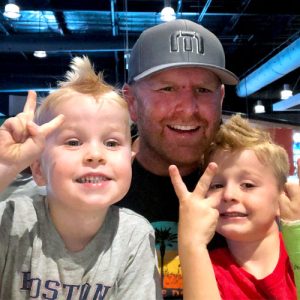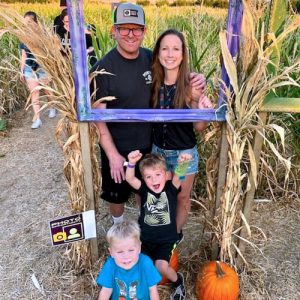 Stephen Smith, a loving husband with two young sons, lived a busy life working full-time, watching his sons’ baseball games, and adventuring outdoors with his wife, Jordyn. But on July 28, 2020, Stephen fell 40 feet from a bucket truck at work and sustained a traumatic brain injury. The injury left Stephen with behavior problems and multiple cognitive deficits, including impaired memory, attention, and processing. Jordyn was not only worried for her husband’s health, but also had to manage caring for their children at home who were ages 3 and 1 at the time.
Stephen Smith, a loving husband with two young sons, lived a busy life working full-time, watching his sons’ baseball games, and adventuring outdoors with his wife, Jordyn. But on July 28, 2020, Stephen fell 40 feet from a bucket truck at work and sustained a traumatic brain injury. The injury left Stephen with behavior problems and multiple cognitive deficits, including impaired memory, attention, and processing. Jordyn was not only worried for her husband’s health, but also had to manage caring for their children at home who were ages 3 and 1 at the time.
Stephen began his recovery journey at Craig Hospital in Colorado, where he received acute care for his injury. He then began a transitional program for a short period of time before returning home for at-home therapy. However, when Stephen stopped receiving therapy, Jordyn quickly noticed a downward spiral in his behavior and mental health. Stephen’s case manager recommended Centre for Neuro Skills (CNS) for post-acute neurorehabilitation.
 In July 2022, Stephen and Jordyn made the journey from Temecula to CNS’ clinic in Bakersfield, the flagship location that specializes in treating patients with behavior problems. Stephen joined CNS’ Continued Care program, which allowed for assisted living, five days a week in therapy, and family counseling. One year later, Stephen’s memory, vision, and behavior have immensely improved. Now, Stephen is determined to move back home to his family.
In July 2022, Stephen and Jordyn made the journey from Temecula to CNS’ clinic in Bakersfield, the flagship location that specializes in treating patients with behavior problems. Stephen joined CNS’ Continued Care program, which allowed for assisted living, five days a week in therapy, and family counseling. One year later, Stephen’s memory, vision, and behavior have immensely improved. Now, Stephen is determined to move back home to his family.
“Our goal for Stephen is to transition home so he can be dad and husband again,” says Jordyn.
At the residential apartments, Stephen works on independently managing household chores, such as taking out the trash, cooking, and cleaning. Jordyn travels to the CNS clinic every Friday to attend family support groups and couple’s counseling, where they discuss how Stephen can eventually transition to living at home again and apply these newfound skills.
“The transition isn’t just for Stephen; it’s for our whole family,” Jordyn said. “CNS gives us a level of trust that allows all of us to slowly adjust.”
While Stephen continues to improve his independent activities of daily living (ADL) skills, he is grateful to spend time with his wife and children who visit him each weekend, attending concerts and baseball games together. Stephen is excited to rejoin his hometown community, hoping to drive again and begin volunteering.
CNS Monthly Newsletter
The latest CNS updates, including events, company information, and patient care developments
The Inside View
Quarterly magazine focused on brain injury research, rehabilitation, and advancements shaping the field
Sign-up for one or both to stay connected with brain injury news and recover